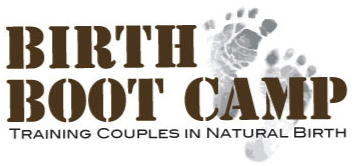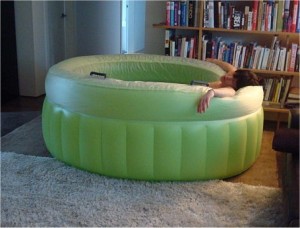Not Your Mother’s Labor: Water Birth Part I
Among the gems of pregnancy “wisdom” passed from generation to generation and still hanging on today, one of the most stubborn is “Don’t get in the tub after your water breaks, you’ll get an infection!”
Is it true? Does dirty tub water get siphoned up the vagina, delivering a direct dose of microbes to the uterus? Or is it a misnomer that should go the way of “If you put your arms over your head the baby will strangle!”
Since many home births, or at least labors, take place in a birthing pool, you’ve likely thought about this issue at some point in your research and/or birth planning.
Whether you’re just mildly curious about the level of risk or you have deep concerns about laboring or birthing in water, a look at some of the available data will bring into focus the scientific truth about this popular pregnancy tale.
I began writing this post with the notion that I’d fit everything I wanted to cover into one post. Well…that’s not going to happen because there is so much delicious info and I don’t want to skimp on sharing details, so it’s going to be a two part series. Besides, if I tried to cram it all into one blog post I wouldn’t have room to share part of my own water birth story. ![]()
So, here we go – let’s begin with the findings of ACOG in their Committee on Obstetric Practice opinion on warm-water immersion in birth:
The Committee feels there are “insufficient data, especially concerning rates of infection, to render an opinion on whether warm-water immersion is a safe and appropriate birthing alternative.”
While ACOG’s opinion usually needs to be taken with several grains of salt, it’s a useful jumping-off point – how much data is enough? There is actually a fairly significant body of evidence on outcomes, including infection, and water labor/birth.
Dr. Siegel’s Tampon Experiment
This body begins in 1960 with the work of Dr. Peter Siegel. Dr. Siegel posed the age-old question, “Does bath water enter the vagina?” In his experiment Dr. Siegel had women place tampons into their vaginas then sit in a potassium iodide bath for 15 minutes, then did an iodine reaction test on the tampons.
There was no sign of the tampons, therefore the vaginal vault, having exposure to the water at all. What’s more, five of the women were in the last two weeks of pregnancy and five were in the first three days postpartum. Only one of the women had had fewer than 4 children, and most were parity 6-10, making Dr. Siegel’s results that much more astounding.
Dr. Siegel’s conclusion read:
Thus, the fear that bath water may infect a pregnant or puerperal woman is not founded on fact, since normally no water enters the vagina. Therefore, restrictions on bathing during and after pregnancy are not warranted on this basis alone. Moreover, this teaching represents another classic example of error.
Not only does it represent an example of error, it also represents another in a long list of common sense findings that somehow escaped being adopted into standard of practice over the years, although the reasoning has changed, as evidenced by this telling statement on a nurses’ forum:
“Unfortunately, with the lawsuit-happy public these days, it would take only one case of “tub acquired” infection to ruin an OB’s practice and put the tubs in mothballs.”
Sadly that’s the truth about most common obstetrical practices these days – it’s all about liability. Fortunately that’s not such an issue with home birth, however it’s still prudent to know what the research says so that we go into birth armed with information and ready to refute antiquated nonsense that may be slung our way.
In this first installment on water birth, I will cover a couple pieces of research that look at infection, one of which focuses specifically on GBS (Group B Strep). In part two, we’ll talk more about data on general outcomes of water labor and birth, encompassing other aspects of maternal/fetal well-being in addition to infection risk.
The Cochrane Review
Firstly let’s take a look at what is considered the largest overview of labor and/or birth in water, the Cochrane Review: Immersion in water in labour and birth, Cluett ER and Burns E., out of University of Southampton in the UK.
This is a review of a group of 12 “randomised controlled trials comparing immersion in any bath tub/pool with no immersion, or other non-pharmacological forms of pain management during labour and/or birth, in women during labour who were considered to be at low risk of complications, as defined by the researchers.”
There were a total of 3243 women included in the comparison, which found no statistically significant difference among the water birthers and land birthers with regard to:
- neonatal infection
- maternal infection
- APGAR scores
- neonatal unit admissions
There was, however, a significant reduction in epidural/spinal anesthesia in the waterbirthing group as well as one trial which revealed a birth satisfaction rate in the immersed moms of four times the rate in the control group.
The reviewers conclude that while more research is warranted:
“There is no evidence of increased adverse effects to the fetus/neonate or woman from labouring in water or water birth.”
Judy Cohain’s Stunning GBS Findings
The second piece of evidence I’d like to look at is a paper by Judy Slome Cohain, CNM published in the Winter 2010-11 issue of Midwifery Today Int Midwife, “Water birth and Newborn GBS disease”.
Cohain found one – yes one – case of early onset newborn GBS in 4432 hospital water births. To understand how astounding this number is, we’ve got to consider that the accepted rate of GBS among births on land, with antibiotic prophylaxis, is approx. one in 1450.
As Cohain points out, there are a number of possible explanations for this incredible reduction in risk – from the water washing the microbes off the baby, to the benefits of kangaroo care, to lower levels of intervention causing a decrease in transmission.
If I were the betting kind, my money would be on a combination of factors resulting in these amazing outcomes, but one thing is as clear as a freshly-filled birth pool – water birth, whether at home or in a facility, likely offers benefits beyond what we’ve even dreamed.
More to come in part two on water birth. Please share your thoughts and experiences with us in the comments…
 Misha Safranski is mother to five beautiful children, birth mother to a sixth, VBAC mom, unschooling parent, intactivist, lactivist, and freelance writer. In addition to working full time for a major online media company, Ms. Safranski publishes an advocacy blog on birth and intuitive parenting issues called Creating Dissonance. She resides in Michigan with her children and furbabies.
Misha Safranski is mother to five beautiful children, birth mother to a sixth, VBAC mom, unschooling parent, intactivist, lactivist, and freelance writer. In addition to working full time for a major online media company, Ms. Safranski publishes an advocacy blog on birth and intuitive parenting issues called Creating Dissonance. She resides in Michigan with her children and furbabies.
A Better Birth Starts With Your Care Provider
The best birth starts with knowing what your ideal birth looks like. Your next step is finding a care provider. This post will help you find the right doctor or midwife.
Today on Labor Day, hundreds of thousands of families are taking to the streets in the United States to rally in support of evidence-based maternity care.
Sitting in my nightgown sipping coffee while my eldest plays make-believe in her fort, my youngest is sleeping peacefully. I can’t help but think about how blessed I am to have given birth to both of them in the comfort and safety of home.
But what I believe was more important than where I gave birth, is who I gave birth with – my midwife.
The best advice can I offer women and families from home today is to doctors and/or midwives until you find the perfect person for the job. Your care provider will make all the difference in your birth.
You MUST know, like and trust the person who will help you have a healthy pregnancy and safe, fulfilling birth experience.
Who is your care provider? Do you know their first and last name? Do they know your name? I sure hope so!
Position yourself as a leader: Be the one in charge
If you want to give birth in a hospital and hire an OB/GYN, schedule a meeting with several doctors for a consultation – in their personal office. If you are interviewing a home birth midwife, you can have this meeting at your home, her home or a public meeting place like a coffee shop.
Make sure that you’re sitting in their personal office, seated in the chair before their desk, and bring a list of questions to ask them.
Ask for references and testimonials from former clients. Ask to speak with those who work with that doctor most frequently and fact check his or her answers to your questions. Make sure everything ads up. If something feels off, walk away.
Just a thought – could you bring along a pocket sized recording devise? Is that legal? Wouldn’t that be the ultimate shocker if you set the tape recorder on his/her desktop?! I guarantee that would be a game changer!
By approaching this process in this way, you are positioning yourself as the boss, interviewing and eventually hiring the perfect person for the job.
You just put the power in your hands.
Remember, there is absolutely no need to feel less than or “beneath” your doctor. He or she is your client, not the other way around!
For more information about how to find the right provider for you, continue reading here: Peaceful Birth – Choosing a Care Provider
Find a local Certified Professional Midwife or Certified Nurse Midwife through these useful links.
Natural Childbirth Training
“You wouldn’t run a marathon without training, so you shouldn’t birth naturally without preparing or training.”
Like every over-used statement, the sentiment behind this saying has been lost. What does it really mean? What are the similarities between training for a marathon vs. preparing for natural birth? The more I thought about it, the more relation I found between physically and mentally training for a sport and natural childbirth.
First of all, let me address the nay-sayers.
Nearly every time I see the “birth is like a marathon” statement, there is usually at least one person in the crowd who feels offended. “Our bodies were made to give birth. We don’t have to train,” is a common comeback.
It’s true. Females bodies- human and animal alike – are designed to give birth to our young. This is how our species continues. But how we human beings differ from our mammal friends is our ability to completely relax and enter a deep meditative state during our births, the way a deer or cat might do, tucked away in a dense thicket.
That’s not to say there aren’t those out there who can have this kind of birth – I absolutely believe in pleasurable, pain-free birth. But I also think that experience is somewhat rare. Natural childbirth preparation is a proactive to having the kind of birth you want.
Labor can be long and arduous.
Mental attitude, place of birth, diet and physical capacities – endurance level and strength – all play a major role in the length and intensity of our labors. A complete natural childbirth preparation course, including exercise, can greatly reduce the need for all kinds of interventions from pain relief, to oxygen, iv or in the case of home birth, transfer to hospital due to maternal fatigue.
Thinking of childbirth prep as “training” will help you.
A marathon runner knows that race day is not the most important – it’s all the days leading up to that day that really matter.
My step-father was a marathon runner. He trained year-round for once race, the Boston Marathon. In the lead up to that race, he’d begin by changing his habits. He would go to sleep earlier, drink more water, eat healthier and of course, he ran every day. Those runs started at 2 miles, working up slowly. Getting his head in the game. Eventually he’d run 15+ miles at a time, but only after his body could withstand it – he had to slowly build up the endurance and strength to run that long.
What if he had run the marathon without training? Could he have done it? I’m sure he could have, especially since he’d run it for more than ten consecutive years. But his time would have been terrible. He might have had to stop running to throw up. His muscles could have seized up. You see what I’m getting at, right?
Often a good, effective labor and birth depends on how much time and energy you put into preparing for it.
True natural childbirth preparation takes more than a one-day visit to the local hospital to sit in on a free class.
Think of your pregnancy as Labor Training. There are hills to climb. Squats to hold. How will you react in the throes of labor? Contractions might start and never stop, coming one after the other without a break at high intensity for a short period of time. Or your rushes might feel more like strong pressure, but make you extremely nauseous go on for 27 hours. What will you do if you’re faced with a labor you weren’t expecting? (Which is very likely to happen.)
My best advice to you is to attend an independent natural childbirth course.
Search for something local if you can, and if nothing is offered in your area, Birth Boot Camp is the next best thing. I highly recommend their 10 week natural childbirth online course. It comes with an awesome Field Manual and breastfeeding DVD.
If you are here reading this post, I know how important your pregnancy, labor, birth and postpartum healing time is to you. Do yourself and your baby a favor and toss every notion that sitting around on your butt eating donuts during pregnancy is okay. It’s not. Re-train yourself to think of pregnancy as the best time in your life to become active – get physically and mentally fit for one of the biggest, most precious days of your life. You’ll thank yourself for it. I promise.
Birth Boot Camp: FAQ
This article is part four in a week long series of articles reviewing Birth Boot Camp, a complete natural childbirth program whose mission is to train couples in natural birth and breastfeeding through accessible, contemporary education. Start here: Birth Boot Camp Introduction
by Sarah @ MamaBirth

A: Birth Boot Camp core curriculum was created by Childbirth Educator Donna Ryan, who has taught classes for nearly a decade. Contributors that have made the program complete come from other educators, a personal trainer, CNMs, CPMs, doulas, a massage therapist, a lactation consultant, a Webster-certified chiropractor, and many other resources. It is a complete and accurate program for todays’ couples. Classes are professionally filmed and edited and include numerous families and birth professionals, sharing their stories and expertise for the classes. Each class runs anywhere from 1-2 hours.
Q: How do the Birth Boot Camp classes apply to women planning a home birth?
A: Donna, the founder of Birth Boot Camp, as well as many of the Birth Boot Camp instructors, have had both hospital and home births. Women have been giving birth since the beginning of time, mostly at home, until the last century. Regardless of where a family chooses to give birth, the process is the same. They need to understand that process. No one can do it for you! No matter how great a midwife or doula is, they can’t go through labor for the mom – which is exciting and terrifying all rolled into one! Classes teach both partners everything they need to know to have an unmedicated birth. The Birth Boot Camp classes specifically focuses on deep relaxation and staying low risk so that your home birth is as fabulous and healthy as possible.
These are the perfect classes for home birth moms because they prepare the mother and the father for the joys – and hard work – of labor and give both partners the confidence and tools they need for a joyful experience.
Sometimes intervention is necessary, even in a home birth. Understanding when and why that might be required is empowering for mom and dad. First, knowing what commonly happens in the hospital helps you feel comfortable in your choice to birth at home. And second, if you choose to or need to go to the hospital at any point, you are prepared for that environment too. Birth Boot Camp gives you the best of both worlds.
Q: Why the name Birth Boot Camp?
A: One of our main goals as a natural childbirth education company is to get the partner involved in the classes and in the birth process. We found that many classes out there cater only to the moms. We prepare BOTH the mom and the dad because we know from years of experience that a great birth experience involves a prepared mother AND a prepared father. A father-to-be isn’t afraid to put his hands on a Birth Boot Camp Field Manual or brochure. After that, the format and the knowledge in the classes will give him the confidence he needs and the assurance that he can do this.
Q: Should I take a live childbirth class or an online class?
A: You know yourself better than anyone. There is no accountability with online classes. Your online instructor cannot look you in the eye and ask how relaxation practice is going or if you are eating a balanced diet. Many people do fine with that and even prefer it that way. If your schedule is hectic, you may have a hard time getting into a live class. You may be 34 weeks into the pregnancy when you find Birth Boot Camp, and with online classes, you can still get the full course.
A live class is preferred for many couples. The community from a class environment is a wonderful way to feel supported on this journey. Your questions are answered immediately and then there is that accountability! Discuss with one another which form of learning will accommodate you best.
Q: When should I start classes?
A: Birth Boot Camp is a 10-week course with a comprehensive breastfeeding DVD included — essentially 11 classes. It is recommended to start classes in the last trimester and preferably not before 25 weeks. You want the information to be fresh in your mind come birth day! Feel free to reserve your spot early, however.
Q: Who should take Birth Boot Camp classes?
A: Birth Boot Camp is designed for couples wanting a natural birth and wishing to avoid interventions, drugs, or a cesarean – unless they become necessary, of course. Both partners will be prepared physically, mentally, and emotionally. Visit Class Descriptions for more details on what you can expect to be covered in class.
Q: Birth Boot Camp is a pretty new company. How do I know it is worth the
money?
A: That is a great question. We realize that it is a commitment to take a birth class and often a financial strain. Here is a sampling of some of the things our clients have already said about us. We are so excited to have couples already having fabulous success with our classes!
“We love it so far! It’s been great for Tim, and we’ve learned great relaxation and massage techniques! I’m looking forward to tonight’s class !” – Courtney
“Just wanted to say that my husband and I are LOVING our Birth Boot Camp classes! Our instructor is so knowledgeable and passionate about the material and we love getting to spend time with other like- minded expecting couples! The Field Guide is STUFFED with priceless information. Today will be our third class and I already feel more prepared for this birth than I ever did for my first! Thank you!!” – Rachel
“We’re doing the online classes right now and they’re awesome! What a blessing to have found something so useful, informative, and convenient. I already feel so much more prepared and confident going into labor!”
And from birth professionals:
“One thing she (Birth Boot Camp instructor) said that really stuck with me is how they teach their moms that labor/birth can be fun/enjoyable experience. This is something I wish more people knew or could realize. Birth isn’t something to fear or run away from. It’s not just something to endure/get through so you can have a baby. It’s something to experience, embrace, and enjoy. Is it easy…NO! It is amazing…YES!!!” – Kathryn
“Just doula-ed another Birth Boot Camp educated couple. They were fabulously prepared and despite a challenging labor had a beautiful natural birth. Thank you for giving them the tools so that we could make yesterday happen!” – Doula Maria
Q: What sets Birth Boot Camp apart from other programs?
A: Birth Boot Camp was created with todays’ couples in mind. It is interactive, utilizing the internet and social media. The materials are relevant and up-to-date. No matter where you are in the world, as long as you have an internet connection, you have access to a complete course preparing you for a natural birth.
Q: What do I receive with my natural childbirth online class?
A: 130-pg Field Manual, breastfeeding DVD, 3 months access to the 10 week program, 10 weeks of supplemental links and materials that complement the information you learned in class, and relaxation downloads with most of the classes.
Q: I would love to teach Birth Boot Camp classes! How do I get involved?
A: We are busy training teachers every few months! You can check our website for upcoming workshops. The trainings are filling up quickly! The first step is to fill out the online application. Once you are accepted into the program, pay your deposit, and receive access to the Instructor website where you will begin your training.
Another option for getting involved with Birth Boot Camp is our affiliate program. This is especially wonderful for bloggers or birth professionals who want to recommend the classes to their readers or clients. You can find more information about that HERE. The affiliate program is an amazing way for us to reward those people who help promote our classes. It also works great for busy families who want to share great classes but don’t have time to teach.
Birth Boot Camp: Become a Birth Boot Camp Instructor
This blog post was written by the Birth Boot Camp Certification Team
Birth Boot Camp is training women who have had an unmedicated birth and breastfed their baby for at least one year to become Birth Boot Camp Instructors.
Our certification program is like  none other. A trainee needs to allow approximately 6-9 months to complete the requirements before coming to their chosen workshop.
none other. A trainee needs to allow approximately 6-9 months to complete the requirements before coming to their chosen workshop.
Our workshop is very hands on, filled with teaching opportunities, learning marketing skills, and taking fellow trainees through relaxation exercises.
The workshop is the finale of the training program. When you leave the workshop, you will be ready to teach in your community. We literally provide everything you need to teach – your instructor manual, birth videos, optional supplemental teaching videos on various topics, and your own student Field Manual. All the games, current resources, links, etc. are all found on the Instructor website.
To apply, fill out this online application. Once you are accepted, pay the deposit for your desired workshop. This is important because not only will this reserve your spot, but you will receive partial access to the Instructor website where you will be able to download your Study Guide and begin your training.
Currently, all workshops are held in the Dallas-Ft. Worth area. We plan to conduct workshops in selected U.S. cities beginning in 2014.
There is such a need for Birth Boot Camp at this time. We are all about natural birth, and we believe our natural childbirth program provides the best “road map” for families to get there. We are contemporary – utilizing the internet and social media to connect with families worldwide. We provide convenience through the online classes – students and Instructors alike are able to take advantage of this valuable resource.
If you have questions about Birth Boot Camp, we are more than happy to answer them. For more information, email [email protected].
Birth Boot Camp: The One & Only Complete Natural Childbirth Course Featured Online
Birth Boot Camp is proud to be the only truly independent, full-length “real” childbirth class offered online.
I am a huge advocate of taking a natural, independent childbirth course during pregnancy.
Unfortunately, there aren’t as many classes as there are couples who would benefit from the information they provide. In some small towns across America, the only programs available are run through local hospitals, are usually free and run for just one day.
This just won’t do! So imagine my excitement when I learned of Birth Boot Camp, which features a complete 10 week natural childbirth program online. Birth Boot Camp also certifies instructors, which are slowly springing up around the country.
Online classes run 1-2 hours and are taught by childbirth educator and founder of Birth Boot Camp, Donna Ryan. Each class is professionally recorded and edited with clips from other birth professionals, alongside birth stories from dozens of couples. When you enroll in the online classes, you will receive a beautiful, full-color workbook called the Field Guide. It’s packed with additional information to accompany each class including several relaxation exercises, weekly Chow Charts, labor charts, an individualized kegel program, a very effective sample birth plan, and the list goes on!
Also included is a 2 disk Breastfeeding DVD – The Ultimate MRE (Meal Ready to Eat) – taught by Lactation Consultant Mellanie Sheppard, IBCLC, RLC.
“We LOVED the classes. They were perfect. When I was pregnant, we have a nice big jacuzzi bath tub we use to bath in together, and we would sometimes watch the videos during bath time. There was more than just one occasion where someone’s either story, or video would make us sob into each others arms from the shear beauty of everything. The videos gave us reassurance that we were not on some pilgrimage to pull off something no one had ever done before. It was great to hear that others had not only done it, but instinctually did it well. I’m very grateful our midwife recommended Birth Boot Camp for us to take.” ~Ashton
There are many reasons why couples choose online classes.
Online classes can be watched on your time schedule. Imagine that you just found Birth Boot Camp at 35 weeks! No problem. Maybe you live where no independent natural childbirth classes are taught. No problem.
A great way to use this course is to put the classes on your calendar and then “attend” class each week, just like you would if you were in a live class. Then, do the assignments, practice the relaxation and exercises, and eat well. It’s the “homework” that makes Birth Boot Camp such a great experience for couples. We bet you’ll even be a stronger couple as a result, ready to welcome your new recruit into your family.
“Classes have been awesome. I don’t want this to sound creepy, but I wish I could come out to Texas and give you a hug! I just love listening to you…and you even have my husband intrigued, asking when our next popcorn/movie night will be! ![]()
I’m due on June 15th… getting closer…. trying to be patient and relax as much as possible. I feel so prepared — I’m actually excited. I can hardly wait! Thanks for a great resource!” ~ Kiera
Natural childbirth preparation is important for every birth – be it your first or third. Visit Birth Boot Camp’s official website, BirthBootCamp.com, to learn more about taking an online class, find out whether an instructor lives near you, or discover how you can become a Birth Boot Camp Instructor.



